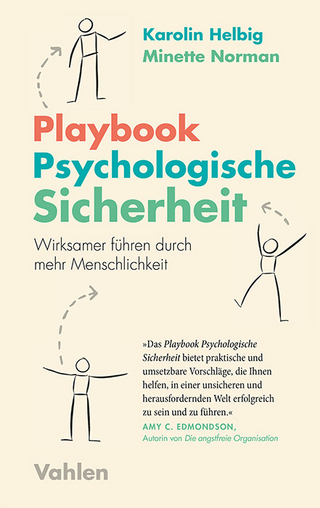
The Cambridge Handbook of Workplace Affect
Cambridge University Press (Verlag)
978-1-108-49403-8 (ISBN)
Are you struggling to improve a hostile or uncomfortable environment at work, or interested in how such tension can arise? Experts in organizational psychology, management science, social psychology, and communication science show you how to implement interventions and programs to manage workplace emotion. The connection between workplace affect and relevant challenges in our society, such as diversity and technological changes, is undeniable; thus learning to harness that knowledge can revolutionize your performance in tackling workday issues. Applying major theoretical perspectives and research methodologies, this book outlines the concepts of display rules, emotional labor, work motivation, well-being, and discrete emotions. Understanding these ideas will show you how affect can promote team effectiveness, leadership, and conflict resolution. If you require a foundation for understanding workplace affect or a springboard into deeper, more interdisciplinary research, this book presents an integrative approach that is indispensable.
Liu-Qin Yang is Associate Professor of Psychology at the Portland State University. Her work has been funded by the National Institute for Occupational Safety and Health, Centers for Disease Control and Prevention, and National Institute for Transportation and Communities. Russell Cropanzano is Professor of Organizational Behavior at the University of Colorado, and a fellow in the Academy of Management and the Association for Psychological Science. Catherine S. Daus is Professor of Psychology at Southern Illinois University, Edwardsville with her Ph.D. from Purdue University, Indiana. Vicente Martínez-Tur is Professor of Organizational Psychology at the University of Valencia, Spain. He coordinates research projects, funded by the Spanish government, about the impact of work and organizational processes on service users.
Foreword; Part I. Theoretical and Methodological Foundations: 1. Emotion at work: from the 'leaner years' to the 'affective revolution'; 2. The organizational neuroscience of emotions; 3. Personality affect construal theory: a model of personality and affect in the workplace; 4. Workplace emotions and motivation: toward a unified approach; 5. Behavioral genetics and affect at work: a review and directions for future research; 6. A review of quantitative methods to measure workplace affect; 7. Qualitative methods to study workplace affect: capturing elusive emotions; Part II. Workplace Affect and Individual Worker Outcomes: 8. Affect, stress, and health: the role of work characteristics and work events; 9. Emotion and various forms of job performance; 10. The role of affect and its regulation for creativity and innovation; 11. Emotional labor: display rules and emotion regulation at work; 12. Advancing the field: reviewing the status of emotional intelligence in the workplace; 13. Affect and workplace judgment and decision-making; 14. The mindful emotion management framework: how mindfulness helps employees manage emotions through reactivity, regulation, and reappraisal; 15. Benefits of negative affective states; 16. Interventions to improve employee well-being; Part III. Workplace Affect and Interpersonal and Team-Level Processes: 17. Leadership, affect, and emotion in work organizations; 18. Affective climate in teams; 19. Workplace affect, conflict, and negotiation; 20. Understanding the role of affect in workplace aggression; 21. The service encounter; 22. Emotion work and emotion management; 23. Dynamic emotional labor: a review and extension to teams; Part IV. Workplace Affect and Organizational, Social and Cultural Processes: 24. Organizational entry and workplace affect; 25. Performance management and workplace affect; 26. Feeling the heat: the importance of affect to organizational justice for receivers, actors, and observers; 27. Gender and workplace affect: expression, experiences, and display rules; 28. Affective climate and organization-level emotion management; Part V. Discrete Emotions at Work: 29. The emotion of interest at work; 30. The antecedents and consequences of fear at work; 31. From self-consciousness to success: when and why self-conscious emotions promote positive employee outcomes; 32. Happiness in its many forms; 33. Envy and jealousy: the role of intrasexual competition in the workplace; 34. Other-focused emotion triads: contempt, anger, and disgust (CAD) and awe, gratitude, and elevation (Age); 35. Schadenfreude at work; Part VI. New Perspectives on Workplace Affect: 36. Diversity and workplace affect: the impact of revealing or concealing a stigma; 37. Implications of technological work practices for employee affect; 38. Looking into the future: integration of research on workplace affect.
| Erscheinungsdatum | 17.07.2020 |
|---|---|
| Reihe/Serie | Cambridge Handbooks in Psychology |
| Zusatzinfo | Worked examples or Exercises; 1 Halftones, black and white; 19 Line drawings, black and white |
| Verlagsort | Cambridge |
| Sprache | englisch |
| Maße | 180 x 252 mm |
| Gewicht | 1130 g |
| Themenwelt | Geisteswissenschaften ► Psychologie ► Arbeits- und Organisationspsychologie |
| Geisteswissenschaften ► Psychologie ► Sozialpsychologie | |
| Wirtschaft ► Betriebswirtschaft / Management ► Planung / Organisation | |
| ISBN-10 | 1-108-49403-X / 110849403X |
| ISBN-13 | 978-1-108-49403-8 / 9781108494038 |
| Zustand | Neuware |
| Haben Sie eine Frage zum Produkt? |
aus dem Bereich


